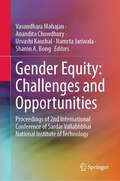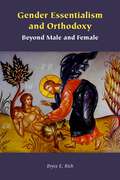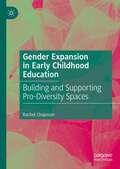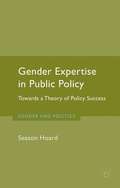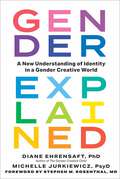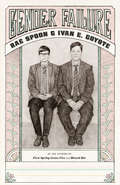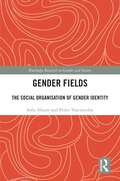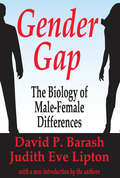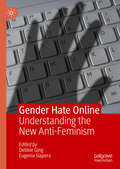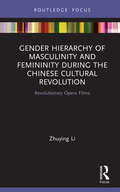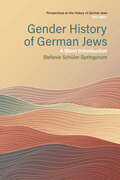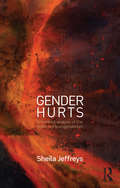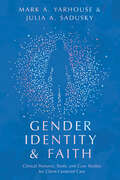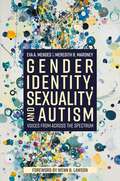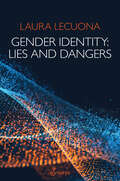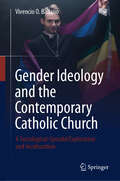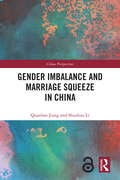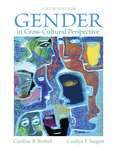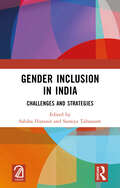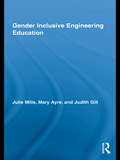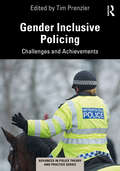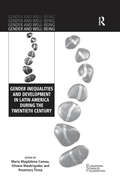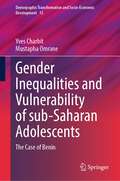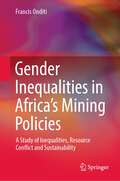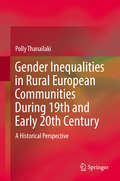- Table View
- List View
Gender Equity: Proceedings of 2nd International Conference of Sardar Vallabhbhai National Institute of Technology
by Sharon A. Bong Vasundhara Mahajan Anandita Chowdhury Urvashi Kaushal Namrta JariwalaThis book comprises the proceedings of the TEQIP III Sponsored 2nd International Conference on “Gender Equity: Challenges and Opportunities” (2nd ICOGECAO 2020 -Virtual Mode), held at Sardar Vallabhbhai National Institute of Technology, Surat, Gujarat, India, from 25 to 27 November 2020. ICOGECAO provided a platform for researchers from multiple countries to present their views about the challenges associated with gender equity. Gender equity is one of the seventeen Sustainable Development Goals (SDG 5) set up by the United Nations in 2015, to promote and empower all genders equally. The proceedings strongly support the ideas of gender neutrality and blow out the mind-set of limiting gender studies to only women rights. They offer a collection of articles that break the stereotypes and myths often wrongly associated with gender. The ideas in the presented papers highlight gender-based discriminations, ask important questions and share facts that encompass beyond the so-called boundary lines. The authors contributed on various topics including but not limited to violence, crime, discrimination, and abuse against women and LGBTQ+ community. The basic motive of the presented book is to incorporate ideas and contribute to the sensitization and education about the important yet often neglected issues of gender equality. Thus, this book proves to be an essential resource for educators and researchers working in the field of gender studies. The work presents challenges caused due to COVID-19, social media, popular culture and work–life balance and explores empowerment through law, skills, technology and media. Some interesting case studies highlighted gender discrimination in science, sports and law. A variety of papers on literary texts were examined from a gender lens. The proceeding is divided into five subsections: 1. law, 2. literature, 3. management, 4. sociology and 5. social studies. The proceeding provides a wider perceptive and visuals about the scenarios which needs attention. The ideas presented will be helpful for achieving the sustainable development goal of gender equity to a greater extent.
Gender Essentialism and Orthodoxy: Beyond Male and Female (Orthodox Christianity and Contemporary Thought)
by Bryce E. RichWithin contemporary orthodoxy, debates over sex and gender have become increasingly polemical over the past generation. Beginning with questions around women’s ordination, arguments have expanded to include feminism, sexual orientation, the sacrament of marriage, definitions of family, adoption of children, and care of transgender individuals. Preliminary responses to each of these topics are shaped by gender essentialism, the idea that male and female are ontologically fixed and incommensurate categories with different sets of characteristics and gifts for each sex. These categories, in turn, delineate gender roles in the family, the church, and society.Gender Essentialism and Orthodoxy offers an immanent critique of gender essentialism in the stream of the contemporary Orthodox Church influenced by the “Paris School” of Russian émigré theologians and their heirs. It uses an interdisciplinary approach to bring into conversation patristic reflections on sex and gender, personalist theological anthropology, insights from gender and queer theory, and modern biological understandings of human sexual differentiation. Though these are seemingly unrelated discourses, Gender Essentialism and Orthodoxy reveals unexpected points of convergence, as each line of thought eschews a strict gender binary in favor of more open-ended possibilities.The study concludes by drawing out some theological implications of the preceding findings as they relate to the ordination of women to the priesthood, same-sex unions and sacramental understandings of marriage, definitions of family, and pastoral care for intersex, transgender, and nonbinary parishioners.
Gender Expansion in Early Childhood Education: Building and Supporting Pro-Diversity Spaces
by Rachel ChapmanThis book explores the contexts for gender identity development in early childhood education, examining how early childhood educators’ views on children’s gender identity influence their practice in Australia. The author utilizes feminist post-structuralism, queer theory and performativity as theoretical approaches, and feminist post-structuralist discourse and thematic analyses. The book captures the voices of educators and developers of curriculum documents to explore how gender expansive environments can be created when such environments are socially and politically contentious. It then identifies discourses that enable and constrain the building of pro-diversity spaces and contexts in early childhood education, while considering how to disrupt normative notions of gender and promote the deployment of discursive agency.
Gender Expertise in Public Policy
by Season HoardThrough a selection of in-depth interviews, survey analysis and Qualitative Comparative Analysis of policy debates in post-industrial democracies, this text examines the impact of gender experts on the policy process, and specifically how the advice and recommendations of gender experts are used by policymakers. It rethinks our understanding of gender expertise and the circumstances and factors that lead to expert success in public policy, and identifieS the actors involved in this process. This volume also contributes to scholarly knowledge on gender expertise through the inclusion of an in-depth review of feminist and non-feminist literatures, and develops a conceptualization of gender expertise that can be utilized to drive future research.
Gender Explained: A New Understanding of Identity in a Gender Creative World
by Diane Ehrensaft Michelle JurkiewiczA world-leading expert and clinical psychologist team up to explain everything you may not know about gender: what it is, where it came from, and why it’s changing. Gender is everywhere. Politicians argue over it, educational systems struggle to define it, and our friends, neighbors, and children explore it. More than ever before, young people are questioning their gender identities and redefining the role of gender in their lives. How should our society—and we as individuals (parents, teachers, friends)—respond? In Gender Explained, Diane Ehrensaft, PhD, and Michelle Jurkiewicz, PsyD, separate medical fact from fear-mongering falsehoods and answer these questions: What should parents do when their child starts experiencing gender dysphoria? Which sports teams should transgender youth play on? How should schools teach young people about gender? And most important: What is gender-affirming care, and when should an individual have access to it? With clear, expert guidance, this book is a safeguard against political vitriol, and it offers urgent protection for those among us who are transgender and/or nonbinary. Far more than an introduction to gender creativity, it is an invitation to develop compassion for everyone along the gender continuum.
Gender Failure
by Ivan E. Coyote Rae Spoon"Being a girl was something that never really happened for me." -Rae SpoonIvan E. Coyote and Rae Spoon are accomplished, award-winning writers, musicians, and performers; they are also both admitted "gender failures." In their first collaborative book, Ivan and Rae explore and expose their failed attempts at fitting into the gender binary, and how ultimately our expectations and assumptions around traditional gender roles fail us all.Based on their acclaimed 2012 live show that toured across the United States and in Europe, Gender Failure is a poignant collection of autobiographical essays, lyrics, and images documenting Ivan and Rae's personal journeys from gender failure to gender enlightenment. Equal parts hilarious and heartbreaking, it's a book that will touch LGBTQ readers and others, revealing, with candor and insight, that gender comes in more than two sizes.Ivan E. Coyote is the author of six story collections and the award-winning novel Bow Grip, and is co-editor of Persistence: All Ways Butch and Femme. Ivan frequently performs at high schools, universities, and festivals across North America.Rae Spoon is a transgender indie musician whose most recent CD is My Prairie Home, which is also the title of a new National Film Board of Canada documentary about them. Rae's first book, First Spring Grass Fire, was a Lambda Literary Award finalist in 2013.
Gender Fields: The Social Organisation of Gender Identity (Routledge Research in Gender and Society)
by Sofia Aboim Pedro VasconcelosExploring gender through the lens of field theory, Gender Fields proposes a new framework for understanding the social organisation of gender identity. In conversation with Pierre Bourdieu's field theory, the book conceptualises under-theorised situated dimensions of gender, bridging the gap between macro and micro theories of gender. Drawing on extensive fieldwork conducted over five years in several countries in Europe and beyond, the authors situate gender as a critical site of autonomous socio-political struggle and highlight the centrality of the transgender experience in redefining gendered personhood and freedom. Increased trans visibility catalysed new social and political arenas of contestation that expanded the potential for reimagining gender norms and identities. The authors examine political and legal arenas, the medical field and health markets, gender naming, individual practices, and material-discursive embodiments, offering new insights into gender change. While numerous explanations have been proposed, this book offers a fresh perspective on these revolutionary developments. Gender Fields characterises gender as a field of struggle through a set of basic tools that can be usefully applied to studies in diverse settings. As such, it will appeal to scholars across the social sciences with an interest in issues of gender, social theory and identity.
Gender Gap: How Genes and Gender Influence Our Relationships
by David P. Barash Judith Eve LiptonLet's face it, say Barash and Lipton: Males and females, boys and girls, men and women are different. To be sure, these differences are often heightened by distinctions in learning, cultural tradition, and social expectation, but underpinning them all is a fundamental difference that derives from biology. Throughout the natural world, males are those creatures that make sperm; females make eggs. The oft-noticed "gender gap" derives, in turn, from this "gamete gap." In Gender Gap, Barash and Lipton (husband and wife, professor and physician, biologist and psychiatrist) explain the evolutionary aspects of male-female differences.
Gender Hate Online: Understanding the New Anti-Feminism
by Eugenia Siapera Debbie GingGender Hate Online addresses the dynamic nature of misogyny: how it travels, what technological and cultural affordances support or obstruct this and what impact reappropriated expressions of misogyny have in other cultures. It adds significantly to an emergent body of scholarship on this topic by bringing together a variety of theoretical approaches, while also including reflections on the past, present, and future of feminism and its interconnections with technologies and media. It also addresses the fact that most work on this area has been focused on the Global North, by including perspectives from Pakistan, India and Russia as well as intersectional and transcultural analyses. Finally, it addresses ways in which women fight back and reclaim online spaces, offering practical applications as well as critical analyses. This edited collection therefore addresses a substantial gap in scholarship by bringing together a body of work exclusively devoted to this topic. With perspectives from a variety of disciplines and geographic bases, the volume will be of major interest to scholars and students in the fields of gender, new media and hate speech.
Gender Hierarchy of Masculinity and Femininity during the Chinese Cultural Revolution: Revolutionary Opera Films (Focus on Global Gender and Sexuality)
by Zhuying LiFocusing on the influence of Maoist ideology and masculinist power on the representations of women in revolutionary opera films made during the Cultural Revolution, this book considers the gendered hierarchy between masculinity and femininity in relation to the historic and cultural context in which they were made. Using feminist methodology and epistemology to locate women’s social identity, this book explores the sociological connections between the masculinisation of women and masculinist domination in the context of the Cultural Revolution. Through film analysis, the author examines whether women, rather than 'liberated', were in fact re-gendered and oppressed by masculinist power. By critically evaluating gender hierarchy during the Chinese Cultural Revolution, the book provides hitherto neglected insights into gender within its social and cultural context. This an interdisciplinary book which should appeal to students and scholars across a range of disciplines, including gender studies, Asian studies, China studies, cultural studies and film studies.
Gender History of German Jews: A Short Introduction (Perspectives on the History of German Jews #1)
by Stefanie Schüler-SpringorumThis concise overview traces the Gender history of German-Jews from the early modern period to the present day and provides a unique perspective on both men and women as historical actors in the German lands. By adopting new perspectives on the German-Jewish experience, Stefanie Schüler-Springorum introduces and examines gender narratives and opportunities across a wide range of individual circumstances and during times of discrimination, persecution and deportation. While being directed against all Jews the effects of Nazi policy had remarkably different results, depending on gender, class, marital status, age and religious affiliation. The picture that emerges here of German Jewry in modern times is consequently more vibrant and nuanced.
Gender Hurts: A Feminist Analysis of the Politics of Transgenderism
by Sheila JeffreysIt is only recently that transgenderism has been accepted as a disorder for which treatment is available. In the 1990s, a political movement of transgender activism coalesced to campaign for transgender rights. Considerable social, political and legal changes are occurring in response and there is increasing acceptance by governments and many other organisations and actors of the legitimacy of these rights. This provocative and controversial book explores the consequences of these changes and offers a feminist perspective on the ideology and practice of transgenderism, which the author sees as harmful. It explores the effects of transgenderism on the lesbian and gay community, the partners of people who transgender, children who are identified as transgender and the people who transgender themselves, and argues that these are negative. In doing so the book contends that the phenomenon is based upon sex stereotyping, referred to as 'gender' – a conservative ideology that forms the foundation for women's subordination. Gender Hurts argues for the abolition of ‘gender’, which would remove the rationale for transgenderism. This book will be of interest to scholars and students of political science, feminism and feminist theory and gender studies.
Gender Identity and Faith: Clinical Postures, Tools, and Case Studies for Client-Centered Care (Christian Association for Psychological Studies Books)
by Mark A. Yarhouse Julia A. SaduskyHelping people navigate gender identity questions today is complex and often polarized work.Gender Identity and Faithandemphasizes respect for clients' journeys, without a single fixed outcome, toward congruence between their gender identity and faithdescribes effective clinical postures, assessment and therapeutic tools, and numerous case studiescovers needs and characteristics of children, youth, and adult clientsincludes worksheets and prompts for clients and family members"Integrating personhood and values is no easy feat, especially in our current cultural landscape," the authors write. Those navigating this intersection need clinicians who seek to understand their unique context and journey alongside them with empathy. This book points the way.
Gender Identity, Sexuality and Autism: Voices from Across the Spectrum
by Eva A. Mendes Wenn Lawson Meredith R. MaroneyBringing together a collection of narratives from those who are on the autism spectrum whilst also identifying as lesbian, gay, bisexual, transgender, queer, intersex and/or asexual (LGBTQIA), this book explores the intersection of the two spectrums as well as the diverse experiences that come with it.By providing knowledge and advice based on in-depth research and personal accounts, the narratives will be immensely valuable to teenagers, adults, partners and families. The authors round these stories with a discussion of themes across narratives, and implications for the issues discussed. In the final chapter, the authors reflect on commonly asked questions from a clinical perspective, bringing in relevant research, as well as sharing best-practice tips and considerations that may be helpful for LGBTQIA and ASD teenagers and adults. These may also be used by family members and clinicians when counselling teenagers and adults on the dual spectrum.With each chapter structured around LGBTQIA and autism spectrum identities, Gender Identity, Sexuality and Autism highlights the fluidity of gender identity, sexual orientation and neurodiversity and provides a space for people to share their individual experiences.
Gender Identity: Lies and Dangers
by Laura LecuonaThousands of pages of books, millions of characters in tweets and hundreds of blogs have been devoted to explaining the distinction between sex and gender, but far from clarifying anything, bewilderment for ordinary people is only growing.The concept of gender is central to a vaguely progressive-looking set of ideas based on the maxim that people possess a so-called ‘ gender identity' . The real problem arises when this nebulous concept, bandied about with different and even incompatible meanings by different groups, is used as a prop to introduce policies that mark a huge setback for the rights of women and girls. The general public, watching the controversy from the sidelines, is confused by conflicting claims about whose rights are being infringed.In this incisive book, Laura Lecuona sets the record straight by reviewing the origin of the current uses of the key term gender and exploring the main theories of transgenderism. She discusses what lies behind the claims about pronoun usage and warns about the consequences of promoting the recognition of so-called transgender children. She points out the collateral damage arising from this activism, from the perpetuation of sexist roles to limitations on freedom of speech. She dares to confront the accusations of transphobia that often inhibit those who question the foundations of this financially-driven and increasingly dominant ideology and shows the devastating effects transactivism is having on women, both socially and politically. Gender Identity: Lies and Dangers is essential reading for the urgently needed conversation we need to have about whose interests are being served with the advancement of transgender ideology and what this means for women' s sex-based rights.
Gender Ideology and the Contemporary Catholic Church: A Sociological-Synodal Exploration and Inculturation
by Vivencio O. BallanoThis book sociologically investigates the contemporary Catholic Church’s stance on gender diversity and “gender ideology” and explores ways to adapt the social science perspectives on sex, gender, and gender fluidity in the Church’s moral teachings, applying Pope Francis’s inductive synodal theology. Using the sociological theories on gender, moral panics, and morality and drawing on secondary literature, media reports, and church documents, it specifically unpacks the “gender ideology’s” alleged grave threats to humanity, family, children, and human dignity as moral panics as well as examines the Catholic morality of gender-enhancement treatment and sex change. Ultimately, this book aims to inculturate or adapt the contemporary sociological gender theory and research in the Catholic Church’s moral doctrines as a synodal response to the “signs of the times.” It therefore appeals to church authorities, moral theologians, LGBTQI leaders, as well as scholars and students of sociology, religion, and gender studies.
Gender Imbalance and Marriage Squeeze in China (ISSN)
by Shuzhuo Li Quanbao JiangThis book presents a comprehensive analysis of China’s imbalanced sex ratio at birth and marriage market, and the implications of these phenomena for population development and families.China’s persistently high sex ratio at birth (SRB) since the early 1980s has led to serious gender imbalance and male marriage squeeze. After examining the quality of existing data on SRB, the authors provide their estimates of the sex-selective abortion rate, describe the trends and geographical patterns in SRB, and disaggregate changes in SRB by birth order and province. Special attention is given to the number and proportion of missing girls between 1980 and 2010. Based on the quantitative analyses, the book projects the implications of the severe gender imbalance for China’s population development and the future dynamics of the marriage market, including trends in age at first marriage, the proportion of never-married, the age structure of surplus males, and the life cycle of bare branch families.The book will appeal to scholars and students of demography, sociology, and China studies, especially those interested in China’s population and contemporary society.
Gender In Cross-Cultural Perspective (Sixth Edition)
by Caroline B. Brettell Carolyn F. SargentIntroduces students to the most significant topics in anthropology of gender. Gender in Cross-Cultural Perspective is a one-volume reader built on classic contributions to gender and anthropology, incorporating recent literature on gender roles and ideology around the world. It combines theoretically and ethnographically-based essays and is appropriate for undergraduate and beginning graduate students. Learning Goals Upon completing this book readers will be able to: Name the most significant topics in anthropology of gender Discuss the questions raised by the authors in each section Understand issues of gender in industrial society and developing societies Note: MySearchLab does not come automatically packaged with this text. To purchase MySearchLab, please visit: www. mysearchlab. com or you can purchase a ValuePack of the text + MySearchlab (at no additional cost).
Gender Inclusion in India: Challenges and Strategies
by Sabiha Hussain Suraiya TabassumThis book not only aims at highlighting existing inequalities between men and women, but also their efforts to overcome these challenges, especially so in women belonging to marginalized communities. It tries to explore systematic denial of rights to marginalized women—opportunities and resources that are normally and easily available to other members of a group, and which are fundamental to social, political integration and observance of human rights such as housing, employment, healthcare, civic engagement and democratic participation. The authors through their in-depth discussions and writings have tried to sketch Equal World as imagined by John Stuart Mill in the opening lines of The Subjugation of Women. This book is co-published with Aakar Books. Print edition not for sale in South Asia (India, Sri Lanka, Nepal, Bangladesh, Pakistan and Bhutan)
Gender Inclusive Engineering Education (Routledge Research in Education)
by Judith Gill Julie Mills Mary Elizabeth AyreWomen continue to comprise a small minority of students in engineering education and subsequent employment, despite the numerous initiatives over the past 25 years to attract and retain more women in engineering. This book demonstrates the ways in which traditional engineering education has not attracted, supported or retained female students and identifies the issues needing to be addressed in changing engineering education to become more gender inclusive. This innovative and much-needed work also addresses how faculty can incorporate inclusive curriculum within their courses and programs, and provides a range of exemplars of good practice in gender inclusive engineering education that will be immediately useful to faculty who teach engineering students.
Gender Inclusive Policing: Challenges and Achievements (Advances in Police Theory and Practice)
by Tim PrenzlerGender Inclusive Policing: Challenges and Achievements is an edited collection focused on current challenges, innovations and positive achievements in gender integration in policing in different subject domains and locations. Comprised of essays by expert contributors from across the globe, the book covers a variety of topics including jurisdictional achievements (South Africa, British Isles, Scandinavian countries, Australia), women in leadership (achievements and methods, merit and affirmative action issues), performance comparisons (conduct, ethics, peacebuilding), intersectionality (Indigenous women) and women’s police stations (Argentina). The book explores and grapples with issues of recruitment, deployment and promotion; obstacles to equity; effective integration strategies; management, conduct and policing styles; race and ethnicity; and specialisation. It is an essential resource providing practical exemplars for police managers involved in gender-equity programmes and for professionals involved in advanced-level research, teaching and consulting.
Gender Inequalities and Development in Latin America During the Twentieth Century (Gender and Well-Being)
by Rosemary Thorp María Magdalena Camou Silvana MaubrigadesThis book presents evidence of the evolution of the gender inequalities in Latin America during the twentieth century, using basic indicators of human development, namely education, health and the labour market. There are very few historical studies that centre on gender as the main analytical category in Latin America, so this book breaks new ground. Using case-studies from Argentina, Chile, Colombia, Mexico and Uruguay, the authors show that there is evidence of a correlation between economic growth and the decrease in gender inequality, but this process is also not linear. Although the activity rate of women was high at the beginning of the twentieth century, female participation in the labour market diminished, until the 1970s, when it began to increase dramatically. Since the 1970s, fertility reduction and education improvements and worsening labour market conditions are associated to the steadily increase of women participation in the labour market. By gauging the extent to which gender gaps in the formation of human capital, access to resources, quality of life and opportunities may have operated as a restriction on women’s capabilities and on economic growth in the region, this book demonstrates that Latin America has lagged behind in terms of gender equality.
Gender Inequalities and Vulnerability of sub-Saharan Adolescents: The Case of Benin (Demographic Transformation and Socio-Economic Development #15)
by Yves Charbit Mustapha OmraneThis book analyses the vulnerability of adolescent girls, which results from cumulative inequalities: gender, lack of education, residential, and poverty. It is based on original analyses of data from the national survey carried out by the National Institute of Statistics and Economic Analysis in collaboration with UNICEF.The book discusses three main themes. First, the experience of adolescence: access to globalization, via access to TIC (Trusted Internet Connections) and mass media; subjective well-being; smoking and alcohol consumption; child discipline and domestic violence are discussed. Secondly, the book focusses on the beginning of fertile life: child marriage; early pregnancy; prenatal care; birth weight and breastfeeding. HIV/AIDS and sexuality.The third theme touches on the potential contribution of adolescents to harvesting the demographic dividend: fertility and contraception; postnatal care and vaccination of children; pre-school learning; education and gender; household health vulnerability (water and sanitation). On the basis of the analyses of data, implications regarding concrete policy measures aimed at reducing the vulnerability of adolescents are identified at the end of each chapter.Through the richness of the analyses and the methodological rigor, this book provides an interesting read to both specialists and non-specialists interested in adolescence and the future of Benin, Africa and beyond.The [basis of the] English translation of this book from its French original manuscript was done with the help of artificial intelligence. A subsequent human revision of the content was done by the author.
Gender Inequalities in Africa’s Mining Policies: A Study of Inequalities, Resource Conflict and Sustainability
by Francis OnditiThis book develops a discursive ‘equalitarian’ theoretical framework for studying African mining ecosystem issues and policy interventions. The theory of ‘equalitarianism’ is developed as an alternative to the reductionist approach that has dominated post-colonial debates about the classical jus ad bellum requirements to empower women in development spaces. However, the classical approach narrows the debate down to “women issues,” rather than the ‘whole-of-society.’ As a consequence of this reductionism, women continue to be devalued in the mining sector, characterized by poverty traps, power struggles, and a lack of capacity to engage in large-scale mining (LSM) activities. This book advances principles for a holistic approach, and spells out the implications for women across the mining value chain. Drawing on moral scholarship, the book poses that for women to gain access to strategic spaces in the mining sector, the drive for empowerment must be embedded within ‘whole-of-society’ principles. This book is of interest to scholars researching gender policy, public policy, political philosophy, conflictology, and human geography. It also offers practitioners a guide for evaluating their policy work on mainstreaming gender in the mining sector, presenting options for financing, forging partnership and planning for an inclusive economic development in Africa, and beyond.
Gender Inequalities in Rural European Communities During 19th and Early 20th Century: A Historical Perspective
by Polly ThanailakiThis book provides an overview of women’s opportunities for schooling, their social activities, and the social biases they faced in rural communities in Greece, Italy and parts of the Balkans during the 19th and early 20th century. It examines such topics as female illiteracy, the efforts of women-protestant missionaries to expand knowledge through Protestantism, the prejudice against education for women, the socio-economic context, the roles women fulfilled, and the structure of the patriarchal family. The book approaches these issues from the perspective of pedagogy and social history. The fundamental questions discussed by the book are: How was female education viewed by the country folk? What was the role of women in the private and the public sphere? How did peasant women respond to the challenges of the ‘modern’ world? Were they free to express their feelings and ambitions? In what way? Were they happy?
